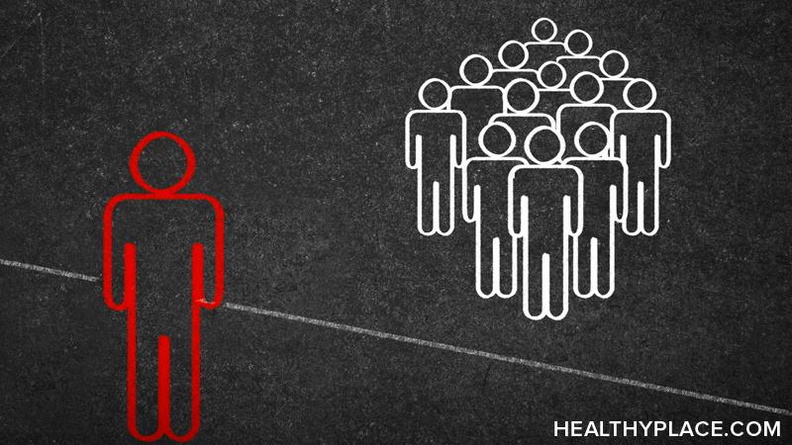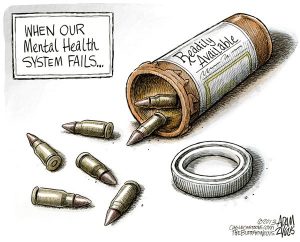Mental Illness and Gun Violence: Stigma Teaches Fear

When it comes to gun violence, mental illness is most of the time an assumed precursor for that violence -- this stigma teaches fear. When mass shootings take place, especially in the U.S., the assailant typically is found to have been suffering from posttraumatic stress disorder, depression, schizophrenia, bipolar disorder – pretty much the staple mental illnesses that popular media knows. When that diagnosis isn’t present, the dig for it begins. News media heavily stigmatizes mental illnesses in this way which lead to fear and the assumption that all mental illnesses will lead to gun violence.
I’ve been hesitant to write about this topic because of how difficult it is to separate gun violence and mental health. On Wednesday, I saw an article shared by the National Alliance on Mental Illness that was published through The Atlantic about violence and mental illness and everything kind of fell into place.
Why the News Media’s Portrayal of Mental Illness and Gun Violence Is Wrong
Awhile back, John Russel Houser opened fire in a movie theatre at a screening of Amy Schumer’s movie Trainwreck.
She said during a press conference,
We can toughen background checks and stop the sale of firearms to folks who have a violent history or history of mental illness.
Toughening background checks and ceasing sale to people with a violent history, yes. I can agree with that. The mental illness part is what rubs me the wrong way. Media consistently portrays the mental unwell as a threat to everyone else (Violent Images: Media and Mental Illness).
The Atlantic’s article references as study from several researchers at Johns Hopkins University who looked at media and mention of violence with mental illness between 1994 and 2014. During that time frame, a reported 55% of stories they looked at correlated the two. Stories that linked gun violence specifically to mental illness increased from 9% between 1995 and 2004 to a shocking 22% between 2005-2014.
The article references another study done by several researchers from Duke University School of Medicine and the University of South Florida who looked at mental illness and violence. The study found people were more likely to use the gun to die by suicide than commit homicide. While this is still an awful situation that needs to be remedied, it goes against what media wants people to think (Should People with a Mental Illness Have Firearm Rights?).
Why There Is Confusion about Mental Illness and Gun Violence
Emma McGuinty, involved in the Johns Hopkins study, agrees that separating the mental state of someone who commits violence from someone who is mentally ill is not so easy.
Anyone who kills someone else in a mass shooting scenario or otherwise is not what we would consider mentally healthy. But that does not mean they have a clinical diagnosis and therefore a treatable mental illness.
The problem, perhaps, is in the language we use. As McGuinty states, we would all agree someone who kills people isn’t mentally well, but when we think of the opposite of mentally well, we think mental illness, which is where proper diagnoses get tangled into the mix. When people commit atrocities, we’re always looking for the why, and when our mental state comes into play, it seems like an obvious choice to blame mental illnesses.
What people need to realize is that there is more to our mental states than just mental wellness (what people would consider “normal”) and diagnosable mental illnesses. As with all things in life, nothing is black and white. Don’t let fear-mongering shape what you think of mental illness. Do some research yourself.
Source
Untangling Gun Violence from Mental Illness. - TheAtlantic.com. (n.d.) Retrieved June 8, 2016.
Gun Violence, Mental Illness, And Laws That Prohibit Gun Possession: Evidence From Two Florida Counties. - Health Affairds. (n.d.) Retrieved June 13, 2016.
Trends In News Media Coverage Of Mental Illness In The United States: 1995-2014. - Health Affairs. (n.d.) Retrieved June 13, 2016.
You can find Laura on Twitter, Google+, Linkedin, Facebook and her blog; also see her book, Project Dermatillomania: The Stories Behind Our Scars.
APA Reference
Barton, L.
(2016, June 9). Mental Illness and Gun Violence: Stigma Teaches Fear, HealthyPlace. Retrieved
on 2026, January 8 from https://www.healthyplace.com/blogs/survivingmentalhealthstigma/2016/06/teaching-fear-of-mental-illness-through-stigma
Author: Laura A. Barton
The correlation between mental illness and gun violence is somewhat complex and intriguing, as well. Introductory, we need to explain substantially mental wellness, respectively mental disorder as component part of mental health. Indeed, mental health indicate a continuous mental state between two extreme points: zero and one hundred, which ones didn't exist in real life. The first point means that the concrete person hasn't any life +ability, whereas one hundred cipher presents the perfect person. Everybody are present between these extreme point of life functioning. In addition, we make many fluctuation in this level of global life functioning, through daily life. From all sides, one person is relatively mental health, and only stigmatization psychiatric patient are mentally ill persons. Therefore, we couldn't incriminate only mentally ill person for gun violence. The criminality data confirm that the number of violent acts is equal among mentally health and mentally ill persons.

